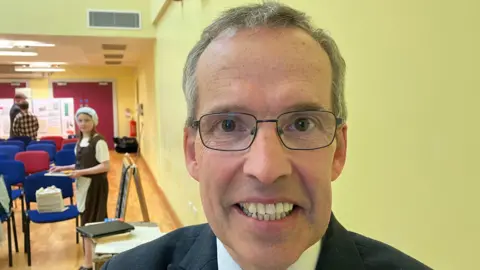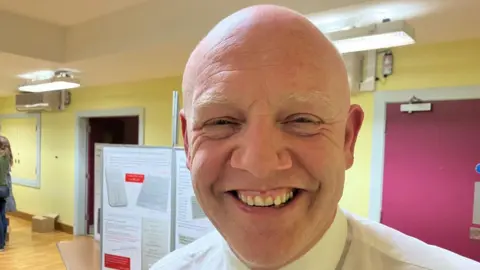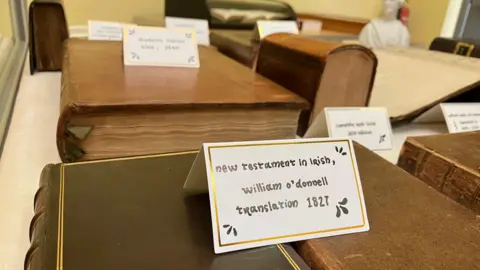Event spotlights Presbyterianism's 'forgotten' Irish language history
 BBC
BBCLanguages, including Irish, are "a gift of God to communicate and to make connections with people".
That is according to the Reverend Kyle Paisley, the son of the late First Minister Ian Paisley.
Mr Paisley spoke to BBC News NI at an event organised by a Free Presbyterian Church on the history of the Presbyterian Church and the Irish language.
He said his late father would have been "deeply interested" and would have attended.
The event, called Preispitéirigh agus an Ghaeilge, was held at Farranshane House in Antrim's Rathenraw estate.
It included a talk on the history of the bible and Presbyterians in the Irish language by Pastor John Duffy and an exhibition of bibles printed in Irish.
'Deep' links between Presbyterianism and the Irish language

Preispitéirigh agus an Ghaeilge was organised by the Pastor of Antrim Free Presbyterian Church, the Reverend Paul Thompson.
He said the event was the "fruit of a lot of work that's been going on behind the scenes in our community".
"There's a deep intersection between Presbyterianism and the Irish language," Mr Thompson told BBC News NI.
"I think there's a great ignorance over the role of Presbyterians.
"From a Christian Pastor, we're seeing young people embrace this as something that's part of their past, their heritage.
"It's creating that environment for people to look back at their history," he said.
"For myself and others in there tonight, it's been a journey looking at history and realising just how much of the past belongs to us.
"It's nothing to be afraid of, it's a great bridge builder.
"We're not asking anybody to give up their identity, but just to enjoy the rich Presbyterian heritage which is a massive part of this island."
Presbyterian Irish language event 'a time of learning'

A crowd of around 100 people attended Preispitéirigh agus an Ghaeilge, including the historian and former Sinn Féin Mayor of Belfast Tom Hartley, DUP founding member Wallace Thompson and Sinn Féin MLA Declan Kearney.
Mr Paisley, who is now a Free Presbyterian minister in England, said the event was "a time of learning, and I have a lot to learn about it".
"You don't get anywhere by ignoring history, and you don't get anywhere certainly by ignoring religious history," Mr Paisley said.
"That's the purpose of tonight's meeting, to highlight something that is often forgotten in the midst of arguments over other things.
"People may tend to think that the Irish language belonged to one section of a community at a time, as opposed to another section, but there was an interest in it in Presbyterian and in Protestant circles, certainly way back then.
"We lose nothing by acknowledging that and we may learn some practical lessons for today," he said.
Mr Paisley added: "I think it was Nelson Mandela that said: 'If you speak to a man in a language that he understands you'll reach his head, but if you speak to him in his language you'll reach his heart.'"

The history of Presbyterians and the Irish language
Presbyterians were among those who kept the Irish language alive in the 18th and 19th centuries.
According to the Presbyterian Historical Society of Ireland, some churches still proclaim themselves part of Eaglais Phreispiteireach in Eirinn (The Presbyterian Church in Ireland).
The Reverend Dr Henry Cooke, a famous Presbyterian minister from the 19th century, evangelised in Irish and required students for the ministry to go to classes in the language.

Alastair Bonar had brought a display of historic bibles in the Irish language to the event, some of which dated back to 1685.
"The Old Testament was translated by a man called William Bedell, who was an English puritan," he said.
"He was the Church of Ireland bishop of Kilmore in County Cavan.
"He was the man who, painstakingly, along with a team of other scribes translated the Old Testament into the Irish language.
"And a man William O'Donnell, he spent a long period of time translating the New Testament into the Irish language.
"And then in the early 1800s a complete copy of the two testaments together was published and that is the Bible that is commonly used today."
Mr Bonar said that William Bedell "wanted the people to have the Bible in their own language".
He said that "a lot of people wouldn't realise the depth of history in the Presbyterian Church concerning the Irish language".
"I can think of one example of a Presbyterian Minister in the Bushmills area who preached every week in the Irish language to his congregation."
